It isn't possible to love and part. You will wish that it was. You can transmute love, ignore it, muddle it, but you can never pull it out of you. I know by experience that the poets are right: love is eternal.E.m. Forster
This desire to govern a woman -- it lies very deep, and men and women must fight it together.... But I do love you surely in a better way then he does." He thought. "Yes -- really in a better way. I want you to have your own thoughts even when I hold you in my arms.E.m. Forster
We cast a shadow on something wherever we stand, and it is no good moving from place to place to save things; because the shadow always follows. Choose a place where you won't do harm - yes, choose a place where you won't do very much harm, and stand in it for all you are worth, facing the sunshine.E.m. Forster
The main facts in human life are five: birth, food, sleep, love and death.E.m. Forster
Life' wrote a friend of mine, 'is a public performance on the violin, in which you must learn the instrument as you go along.E.m. Forster
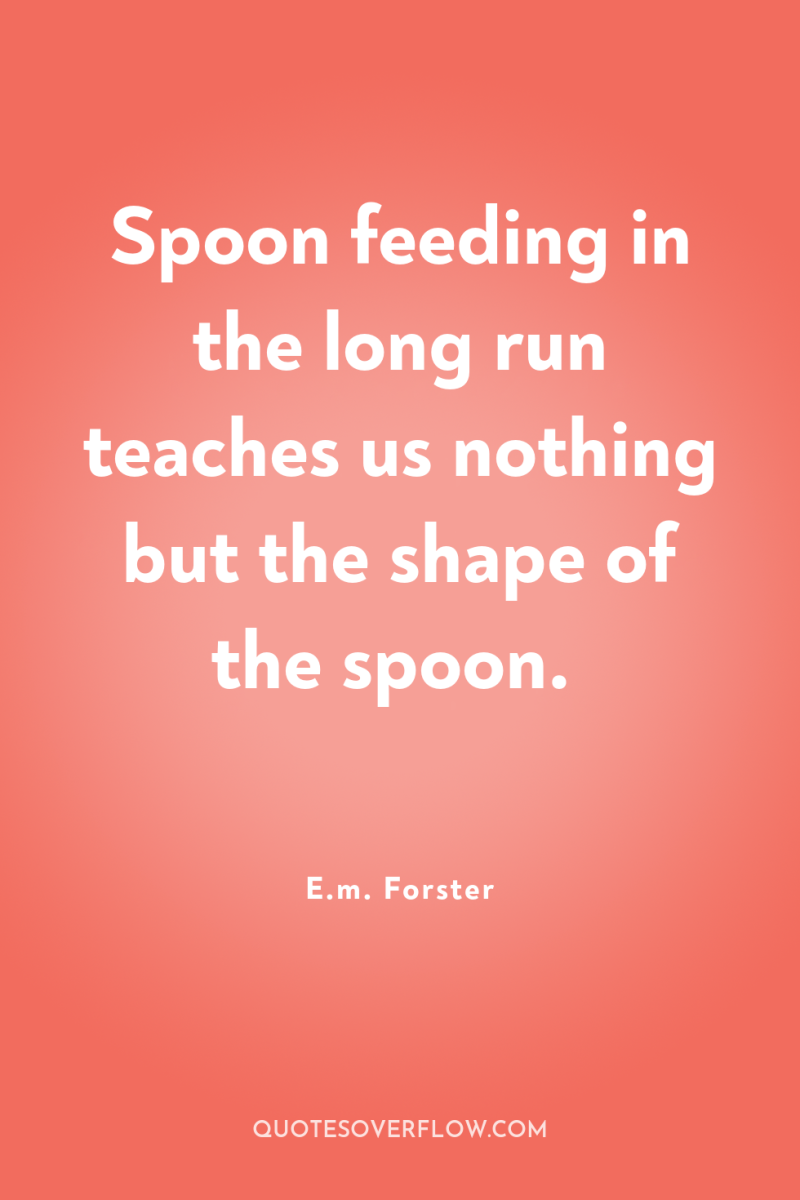
Spoon feeding in the long run teaches us nothing but the shape of the spoon.E.m. Forster

If I had to choose between betraying my country and betraying my friend, I hope I should have the guts to betray my country.E.m. Forster
Culture had worked in her own case, but during the last few weeks she had doubted whether it humanized the majority, so wide and so widening is the gulf that stretches between the natural and the philosophic man, so many the good chaps who are wrecked in trying to cross it.E.m. Forster
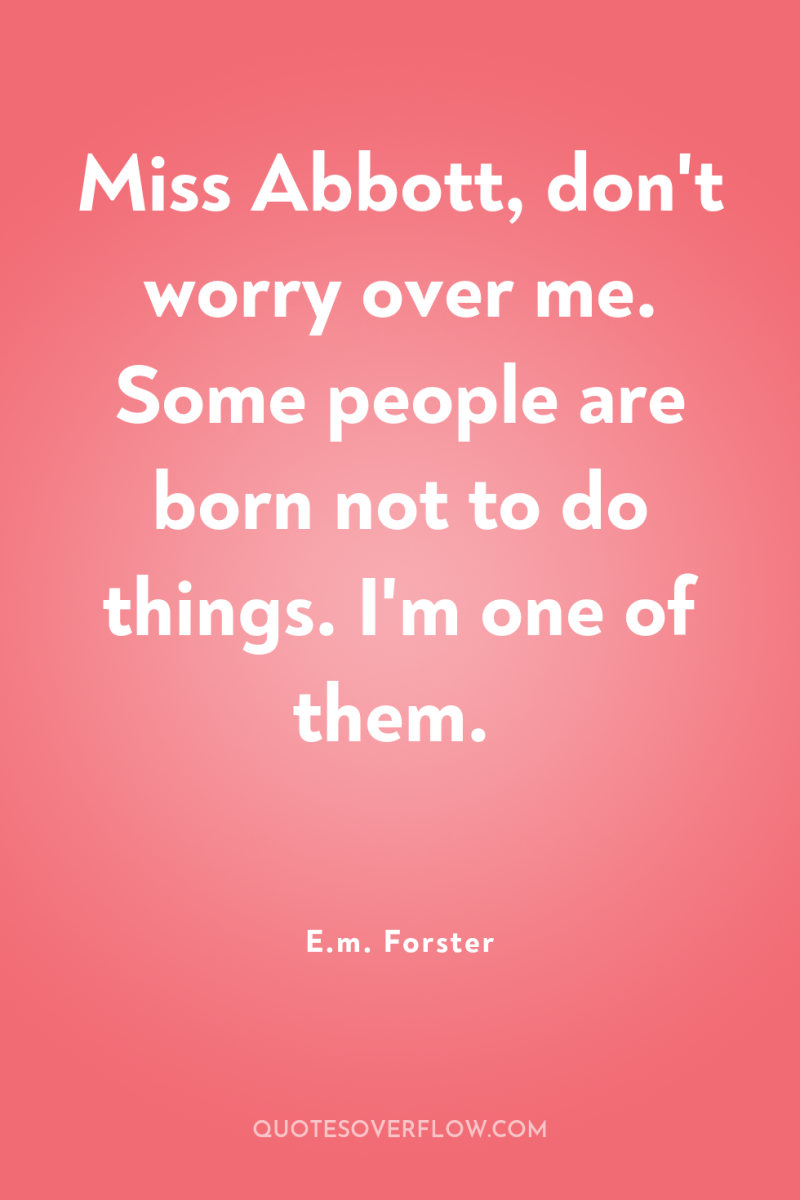
Miss Abbott, don't worry over me. Some people are born not to do things. I'm one of them.E.m. Forster
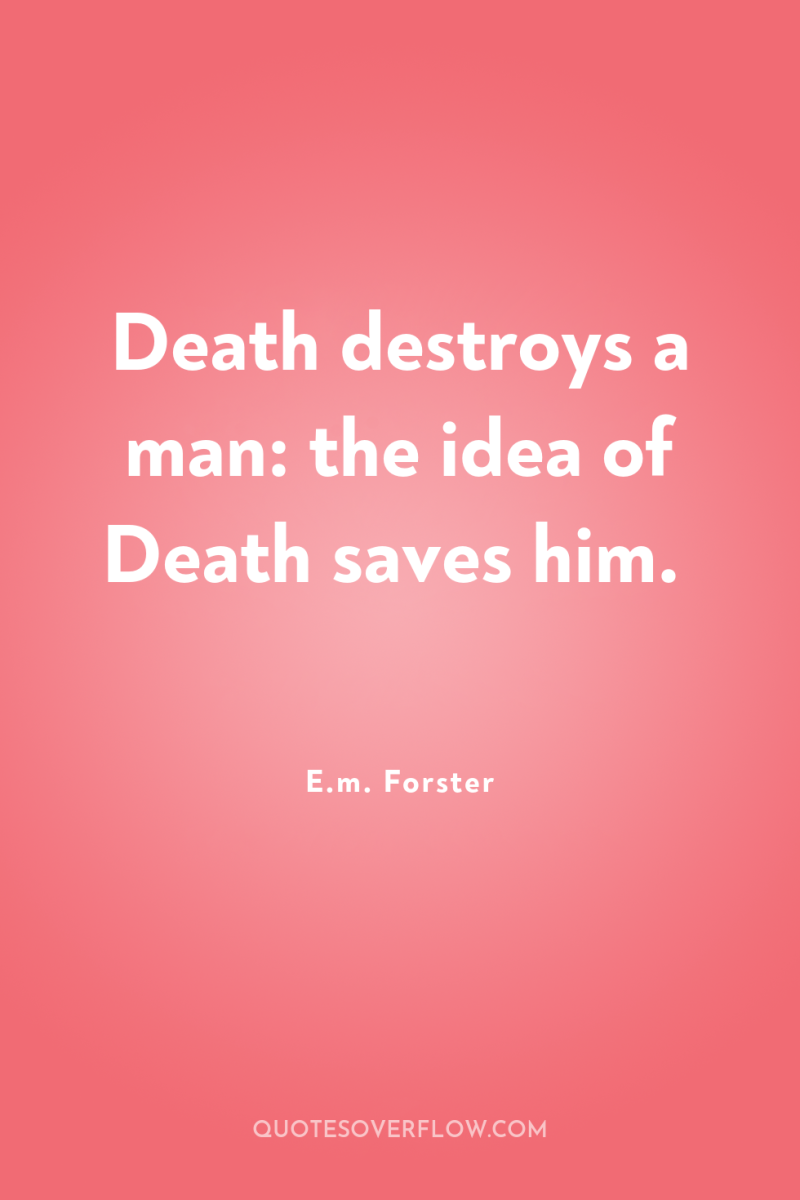
Death destroys a man: the idea of Death saves him.E.m. Forster
She gave up trying to understand herself, and the vast armies of the benighted, who follow neither the heart nor the brain, and march to their destiny by catch-words. The armies are full of pleasant and pious folk. But they have yielded to the only enemy that matters – the enemy within. They have sinned against passion and truth, and vain will be their strife after virtue. As the years pass, they are censured. Their pleasantry and their piety show cracks, their wit becomes cynicism, their unselfishness hypocrisy; they feel and produce discomfort wherever they go.E.m. Forster
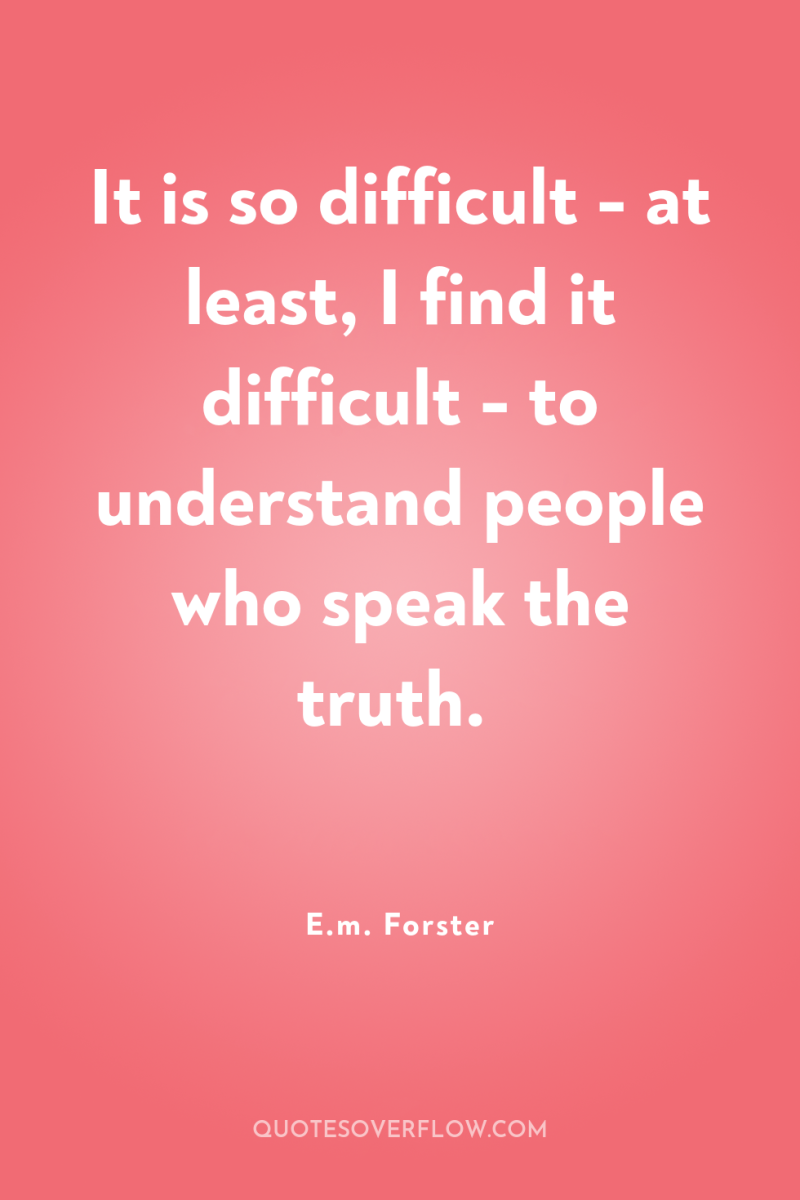
It is so difficult - at least, I find it difficult - to understand people who speak the truth.E.m. Forster
The business man who assumes that this life is everything, and the mystic who asserts that it is nothing, fail, on this side and on that, to hit the truth. "Yes, I see, dear; it's about halfway between, " Aunt Juley had hazarded in earlier years. No; truth, being alive, was not halfway between anything. It was only to be found by continuous excursions into either realm, and though proportion is the final secret, to espouse it at the outset is to ensure sterility.E.m. Forster
The human mind is not a dignified organ, and I do not see how we can exercise it sincerely except through eclecticism. And the only advice I would offer my fellow eclectics is: "Do not be proud of your inconsistency. It is a pity, it is a pity that we should be equipped like this. It is a pity that Man cannot be at the same time impressive and truthful.E.m. Forster
We reach in desperation beyond the fog, beyond the very stars, the voids of the universe are ransacked to justify the monster, and stamped with a human face. London is religions opportunity--not the decorous religion of theologians, but an anthropomorphic, crude. Yes, the continuous flow would be tolerable if a man of our own sort--not anyone pompous or tearful--were caring for us up in the sky.E.m. Forster
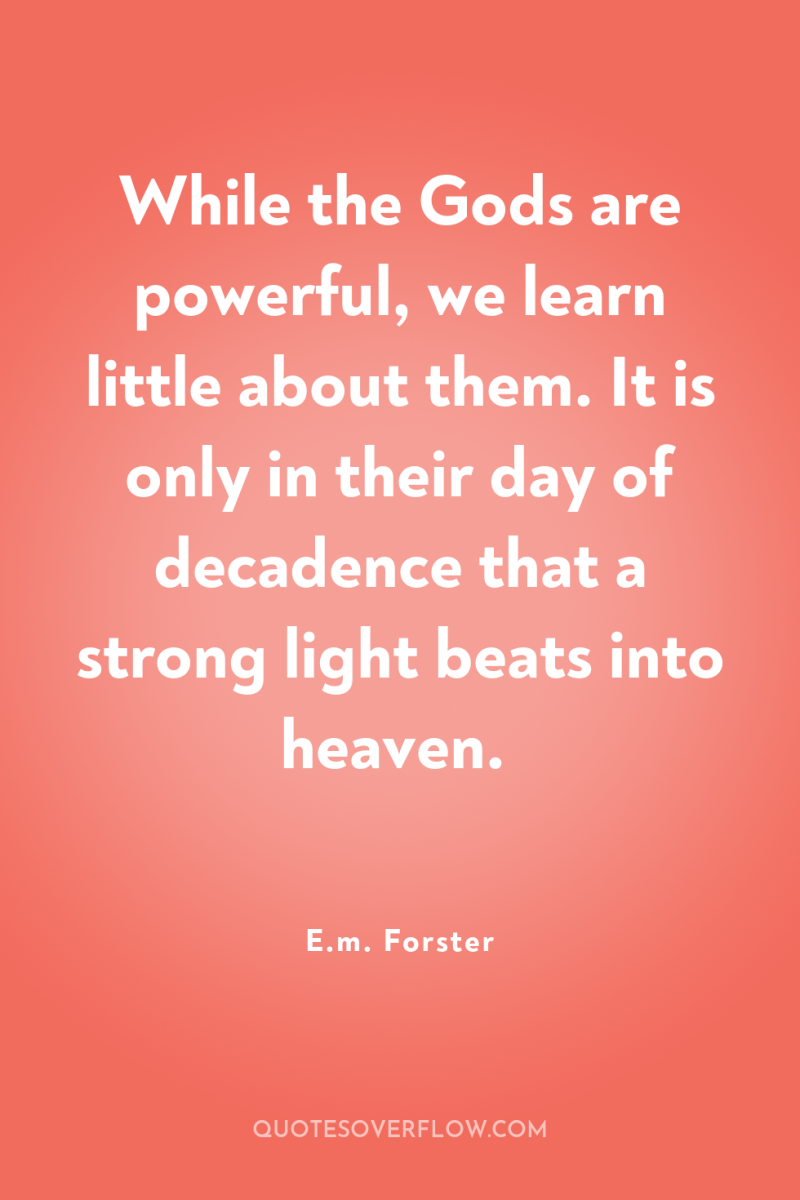
While the Gods are powerful, we learn little about them. It is only in their day of decadence that a strong light beats into heaven.E.m. Forster
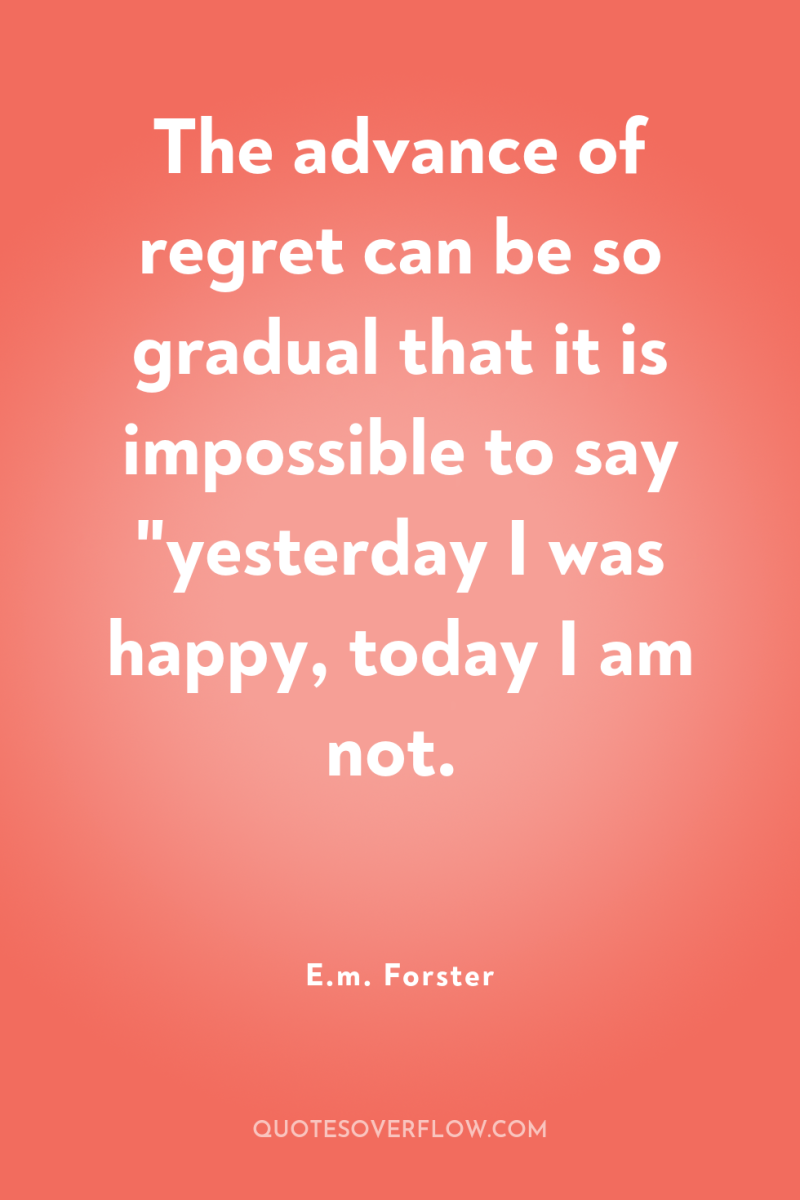
The advance of regret can be so gradual that it is impossible to say "yesterday I was happy, today I am not.E.m. Forster
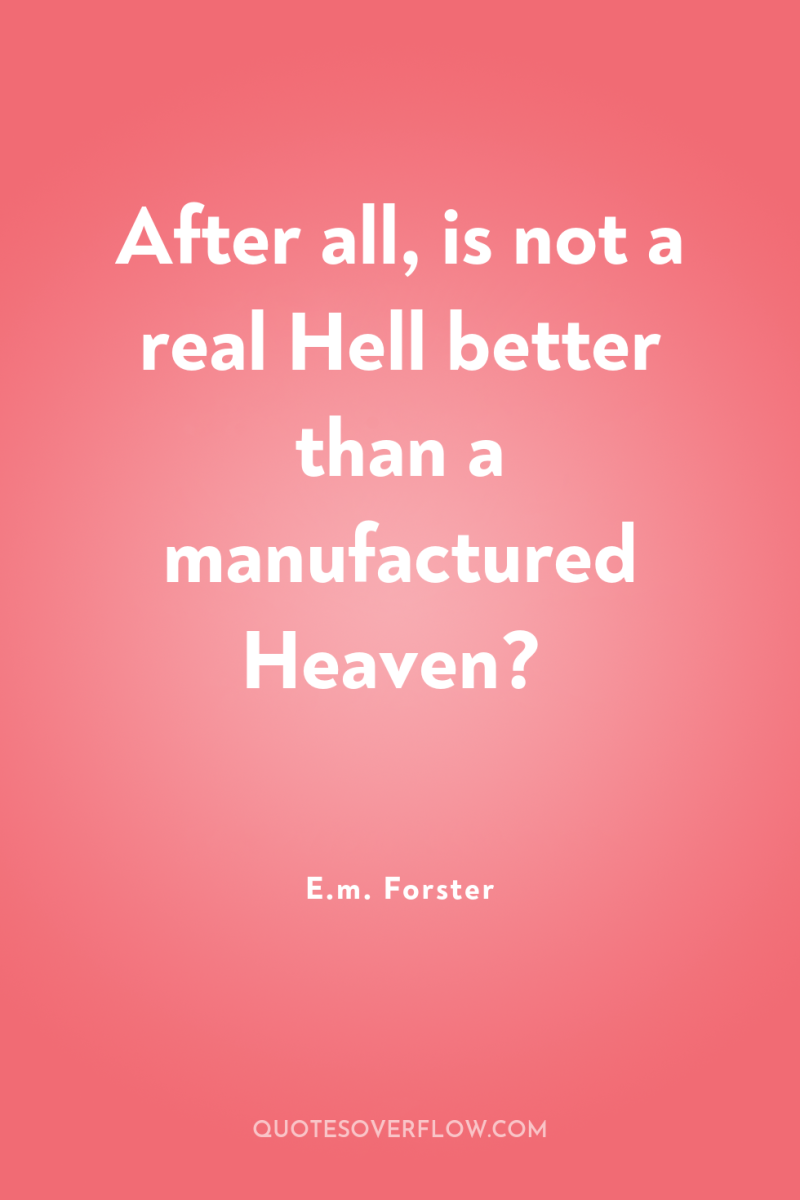
After all, is not a real Hell better than a manufactured Heaven?E.m. Forster
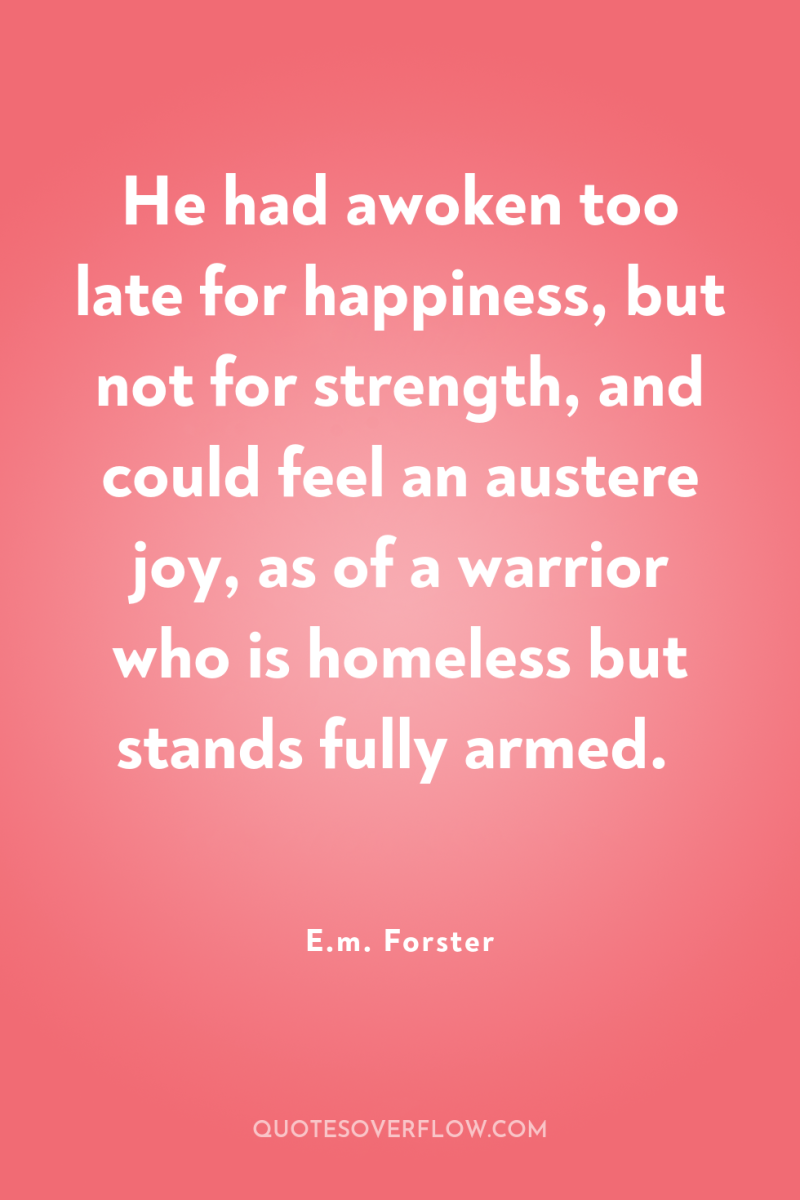
He had awoken too late for happiness, but not for strength, and could feel an austere joy, as of a warrior who is homeless but stands fully armed.E.m. Forster
They must live outside class, without relations or money; they must work and stick to each other till death. But England belonged to them. That, besides companionship, was their reward. Her air and sky were theirs, not the timorous millions' who own stuffy little boxes, but never their own souls.E.m. Forster
I was yours once till death if you cared to keep me, but I'm someone else's now-- I can't hang about whining for ever--and he's mine in a way that shocks you, but why don't you stop being shocked and attend to your own happiness?E.m. Forster
The tragedy of preparedness has scarcely been handled, save by the Greeks. Life is indeed dangerous, but not in the way morality would have us believe. It is indeed unmanageable, but the essence of it is not a battle. It is unmanageable because it is a romance, and its essence is romantic beauty.E.m. Forster
George had turned at the sound of her arrival. For a moment he contemplated her, as one who had fallen out of heaven. He saw radiant joy in her face, he saw the flowers beat against her dress in blue waves. The bushes above them closed. He stepped quickly forward and kissed her. Before she could speak, almost before she could feel, a voice called 'Lucy! Lucy! Lucy! ' The silence of life had been broken by Miss Bartlett, who stood brown against the view.E.m. Forster
Eccolo! ” he exclaimed. At the same moment the ground gave way, and with a cry she fell out of the wood. Light and beauty enveloped her. She had fallen on to a little open terrace, which was covered with violets from end to end.“ Courage! ” cried her companion, now standing some six feet above. “Courage and love.” She did not answer. From her feet the ground sloped sharply into view, and violets ran down in rivulets and streams and cataracts, irrigating the hillside with blue, eddying round the tree stems, collecting into pools in the hollows, covering the grass with spots of azure foam. But never again were they in such profusion; this terrace was the well-head, the primal source whence beauty gushed out to water the earth. Standing at its brink, like a swimmer who prepares, was the good man. But he was not the good man that she had expected, and he was alone. George had turned at the sound of her arrival. For a moment he contemplated her, as one who had fallen out of heaven. He saw radiant joy in her face, he saw the flowers beat against her dress in blue waves. The bushes above them closed. He stepped quickly forward and kissed her… .E.m. Forster
Mr. Herriton, don’t — please, Mr. Herriton — a dentist. His father’s a dentist.” Philip gave a cry of personal disgust and pain. He shuddered all over, and edged away from his companion. A dentist! A dentist at Monteriano. A dentist in fairyland! False teeth and laughing gas and the tilting chair at a place which knew the Etruscan League, and the Pax Romana, and Alaric himself, and the Countess Matilda, and the Middle Ages, all fighting and holiness, and the Renaissance, all fighting and beauty! He thought of Lilia no longer. He was anxious for himself: he feared that Romance might die.E.m. Forster
There was something better in life than this rubÂbish, if only he could get to it–love–nobility–big spaces where passion clasped peace, spaces no science could reach, but they existed for ever, full of woods some of them, and arched with majestic sky and a friend.. .E.m. Forster
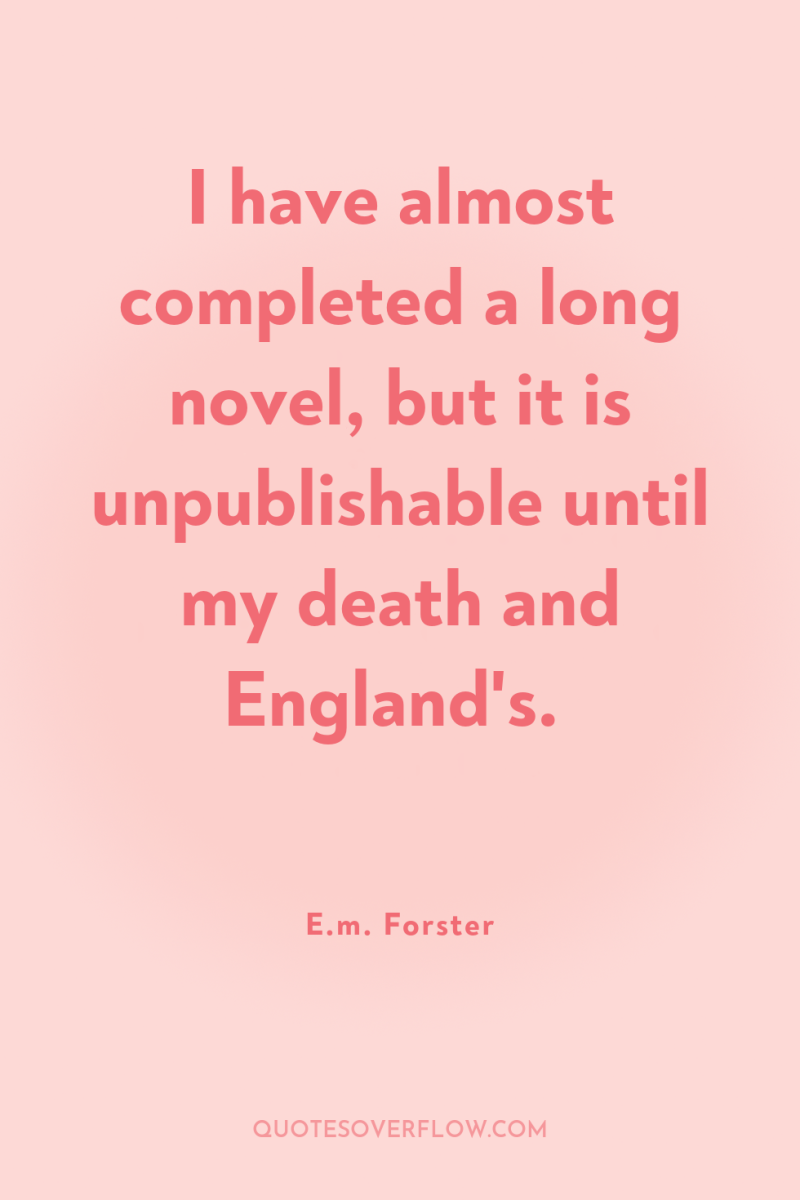
I have almost completed a long novel, but it is unpublishable until my death and England's.E.m. Forster
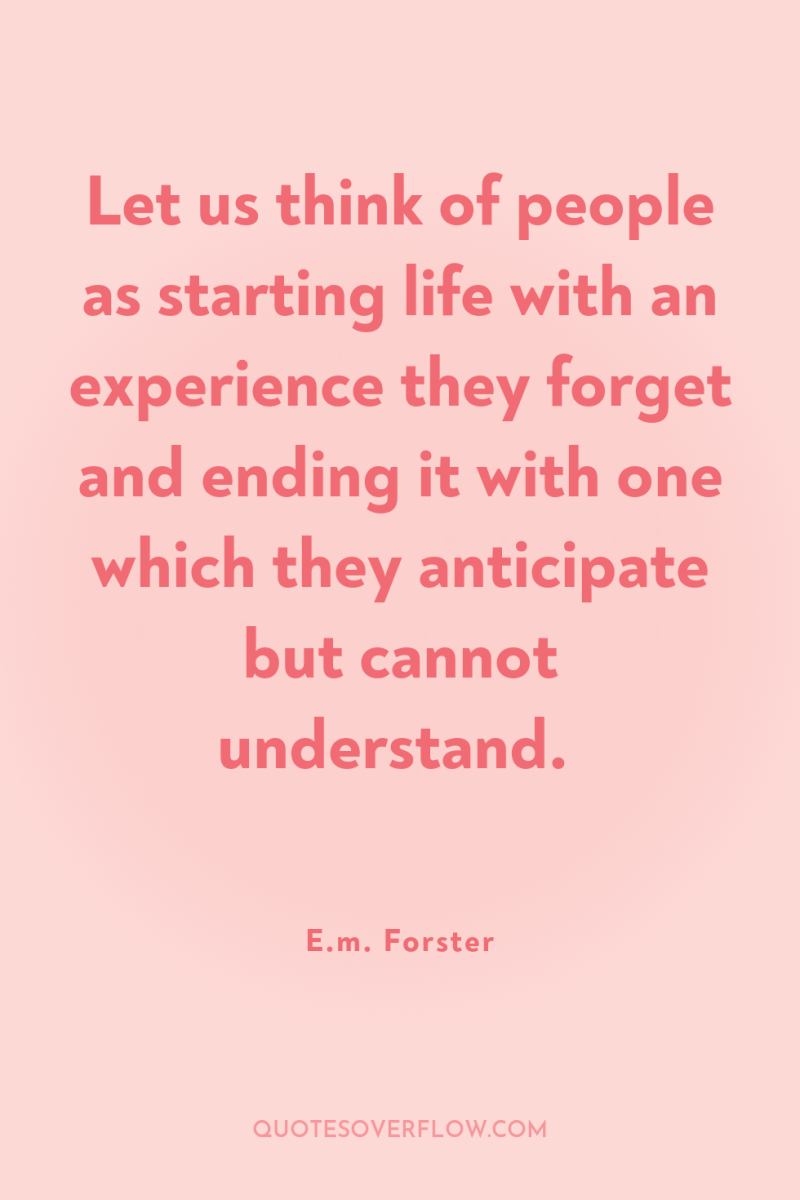
Let us think of people as starting life with an experience they forget and ending it with one which they anticipate but cannot understand.E.m. Forster
If we lived for ever, what you say would be true. But we have to die, we have to leave life presently. Injustice and greed would be the real thing if we lived for ever. As it is, we must hold to other things, because Death is coming. I love death - not morbidly, but because He explains. He shows me the emptiness of Money. Death and Money are the eternal foes. Not Death and Life. Death destroys a man: the idea of Death saves him. Behind the coffins and the skeletons that stay the vulgar mind lies something so immense that all that is great in us responds to it. Men of the world may recoil from the charnel-house that they will one day enter, but Love knows better. Death is his foe, but his peer, and in their age-long struggle the thews of Love have been strengthened, and his vision cleared, until there is no one who can stand against him. .E.m. Forster
Some leave our life with tears, others with an insane frigidity; Mrs. Wilcox had taken the middle course, which only rarer natures can pursue. She had kept proportion. She had told a little of her grim secret to her friends, but not too much; she had shut up her heart--almost, but not entirely. It is thus, if there is any rule, that we ought to die--neither as victim nor as fanatic, but as the seafarer who can greet with an equal eye the deep that he is entering, and the shore that he must leave.E.m. Forster
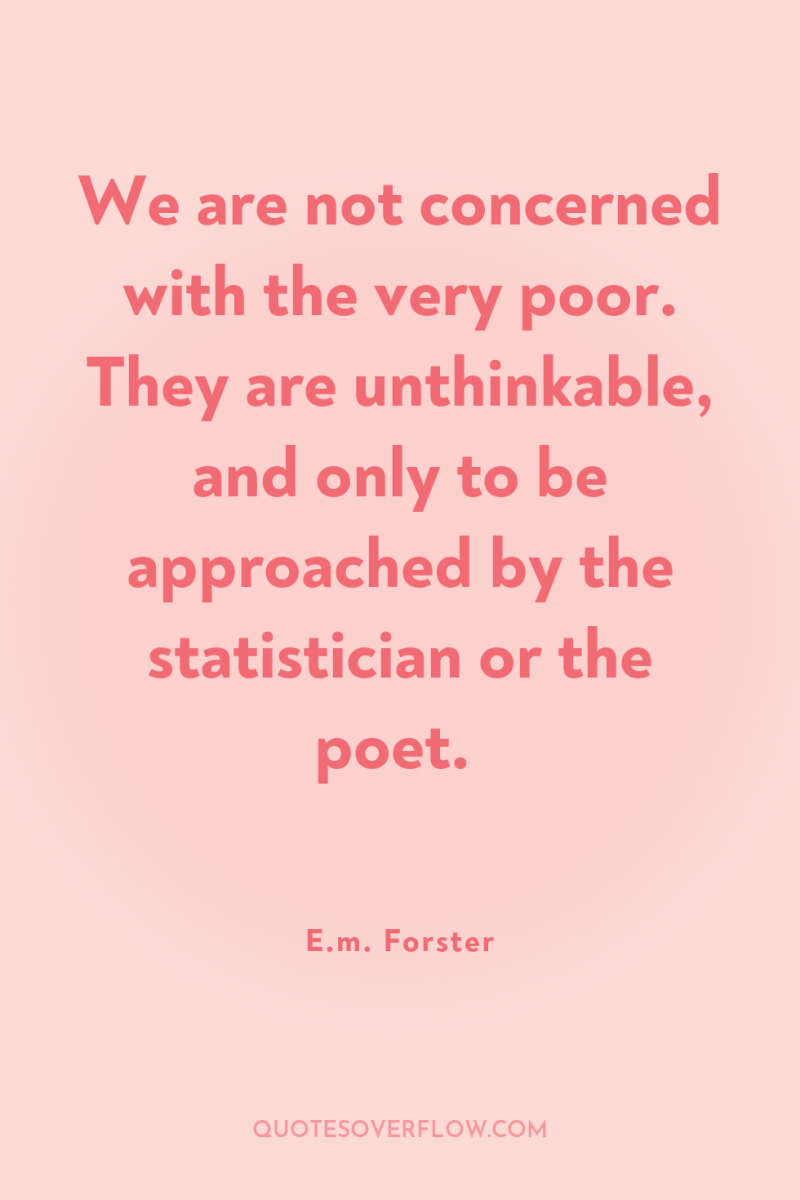
We are not concerned with the very poor. They are unthinkable, and only to be approached by the statistician or the poet.E.m. Forster
The novel is a formidable mass, and it is so amorphous - no mountain in it to climb, no Parnassus or Helicon, not even a Pisgah. It is most distinctly one of the moister areas of literature - irrigated by a hundred rills and occasionally degenerating into a swamp. I do not wonder that the poets despise it, though they sometimes find themselves in it by accident. And I am not surprised at the annoyance of the historians when by accident it finds itself among them. .E.m. Forster
The Waves is an extraordinary achievement ... It is trembling on the edge. A little less - and it would lose its poetry. A little more - and it would be over into the abyss, and be dull and arty. It is her greatest book.E.m. Forster

How do I know what I think until I see what I say?E.m. Forster
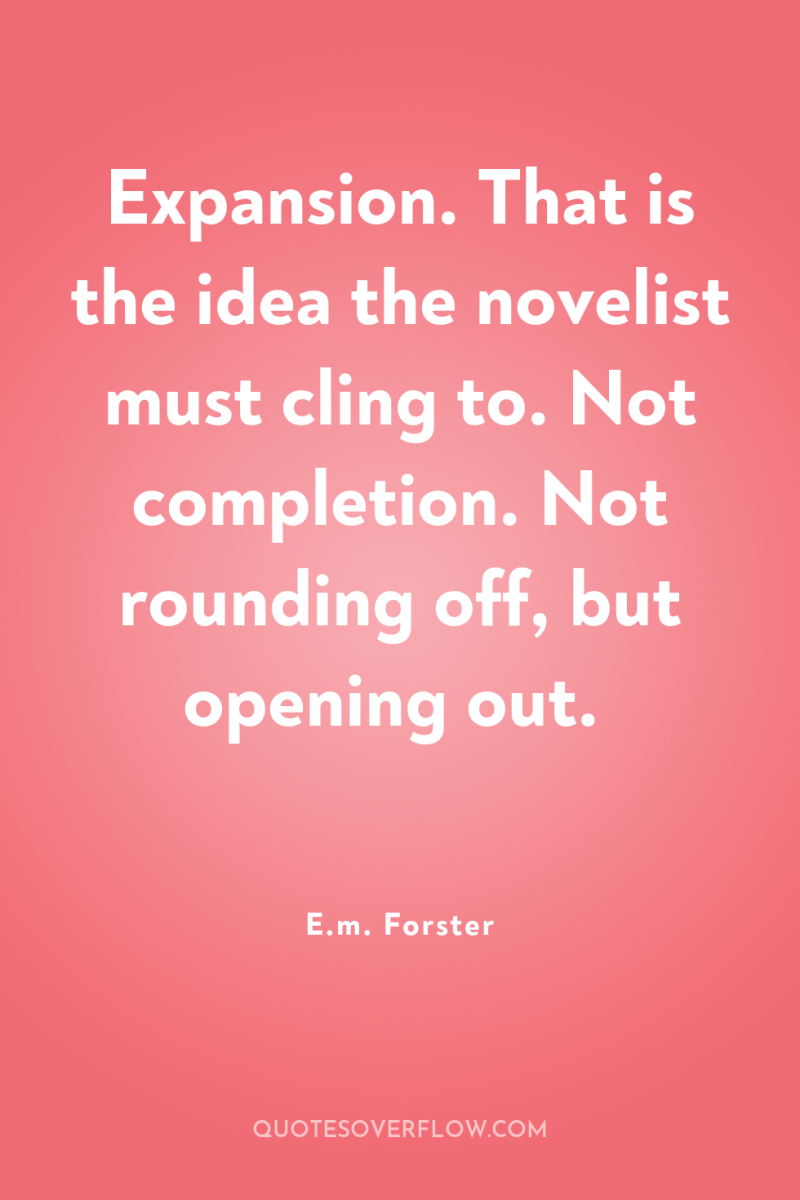
Expansion. That is the idea the novelist must cling to. Not completion. Not rounding off, but opening out.E.m. Forster
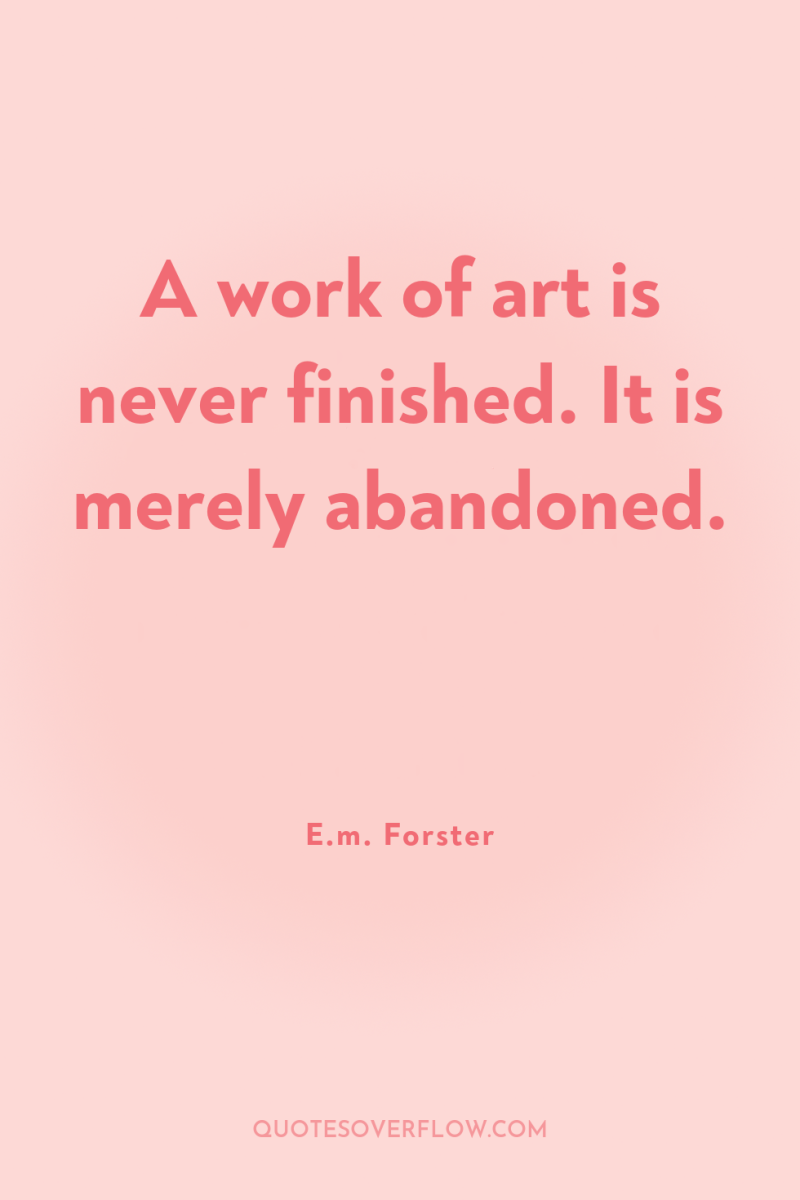
A work of art is never finished. It is merely abandoned.E.m. Forster
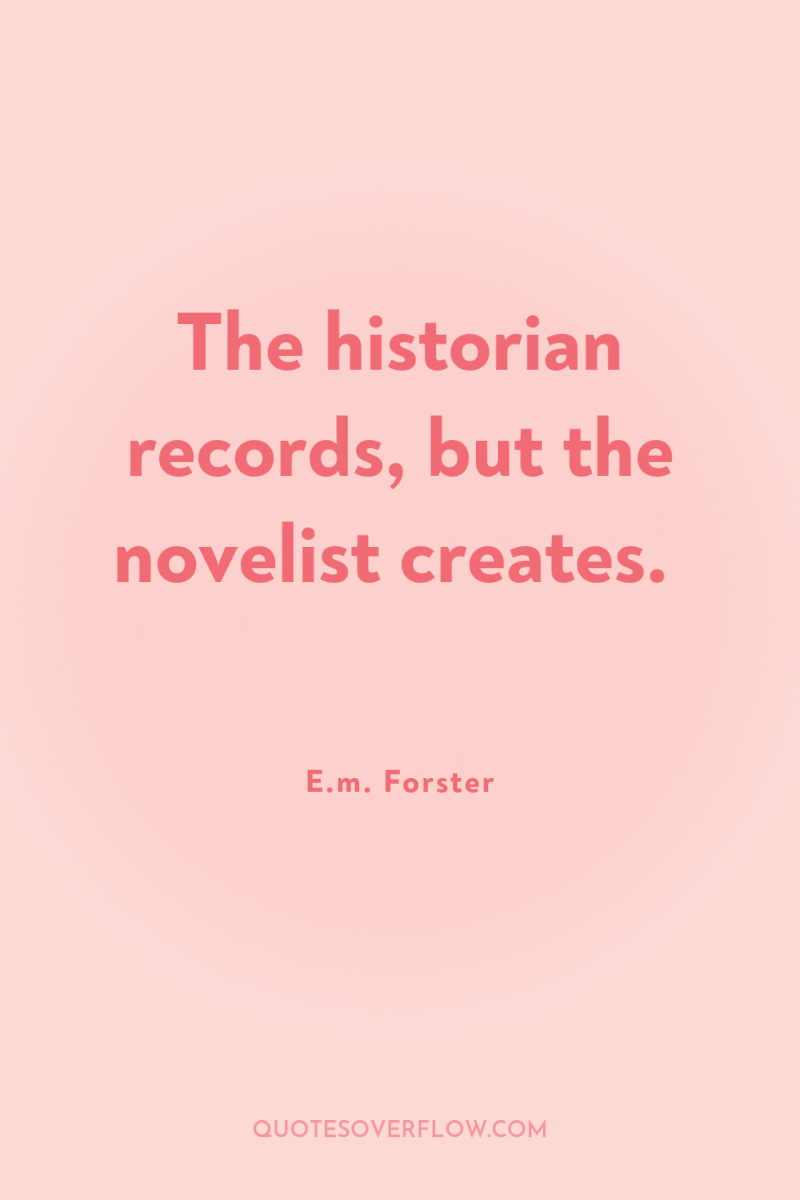
The historian records, but the novelist creates.E.m. Forster
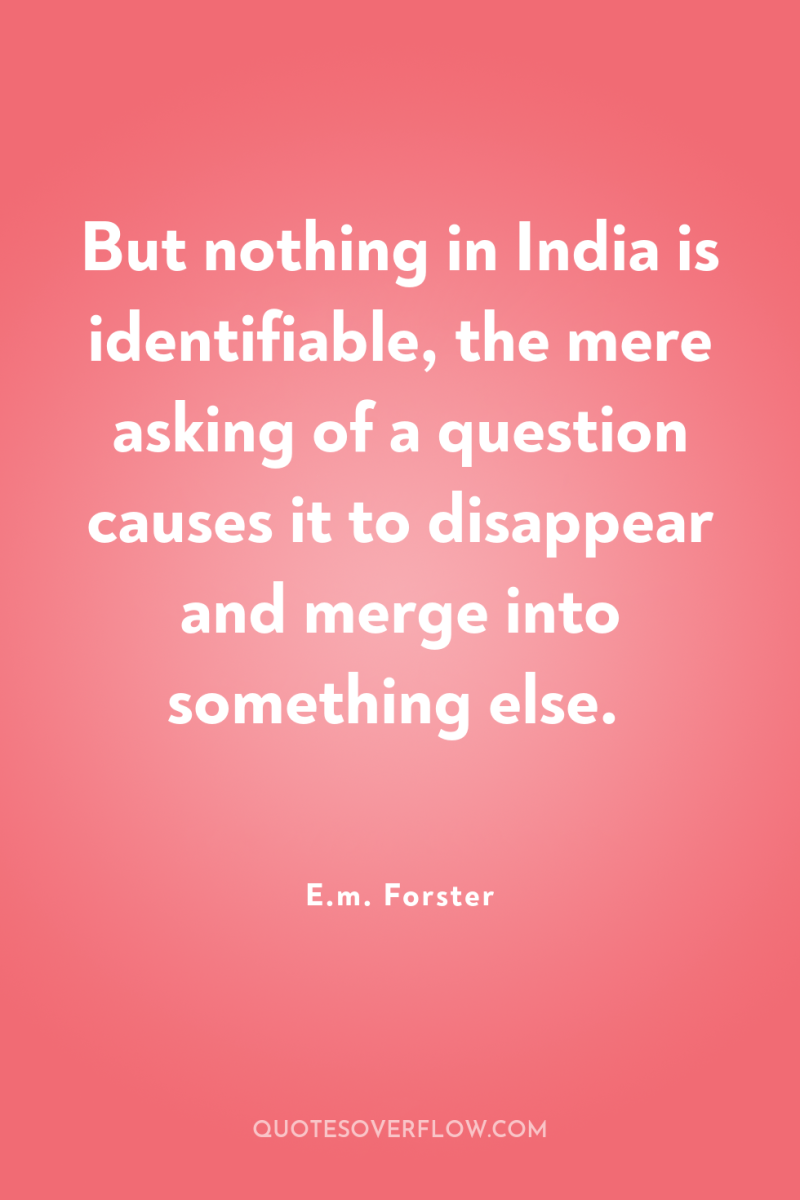
But nothing in India is identifiable, the mere asking of a question causes it to disappear and merge into something else.E.m. Forster
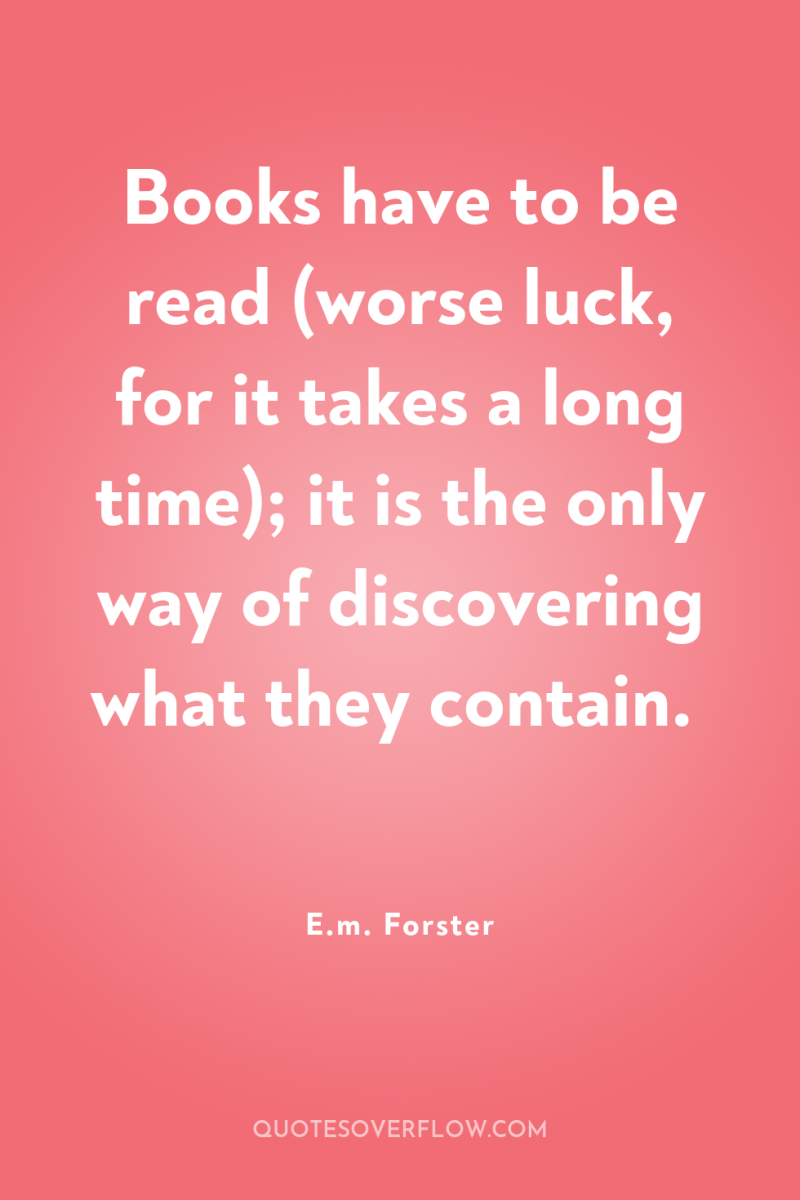
Books have to be read (worse luck, for it takes a long time); it is the only way of discovering what they contain.E.m. Forster
School was the unhappiest time of my life and the worst trick it ever played on me was to pretend that it was the world in miniature. For it hindered me from discovering how lovely and delightful and kind the world can be, and how much of it is intelligible.E.m. Forster
Mr Abrahams was a preparatory schoolmaster of the old-fashioned sort. He cared neither for work nor games, but fed his boys well and saw that they did not misbehave. The rest he left to the parents, and did not speculate how much the parents were leaving to him. Amid mutual compliments the boys passed out into a public school, healthy but backward, to receive upon undefended flesh the first blows of the world. .E.m. Forster
He had known so much about her once -what she thought, how she felt, the reasons for her actions. And now he only knew that he loved her, and all the other knowledge seemed passing from him just as he needed it most.E.m. Forster
He educated Maurice, or rather his spirit educated Maurice's spirit, for they themselves became equal. Neither thought "Am I led; am I leading?" Love had caught him out of triviality and Maurice out of bewilderment in order that two imperfect souls might touch perfection.E.m. Forster
I can only do what's easy. I can only entice and be enticed. I can't, and won't, attempt difficult relations. If I marry it will either be a man who's strong enough to boss me or whom I'm strong enough to boss. So I shan't ever marry, for there aren't such men. And Heaven help any one whom I do marry, for I shall certainly run away from him before you can say 'Jack Robinson.E.m. Forster
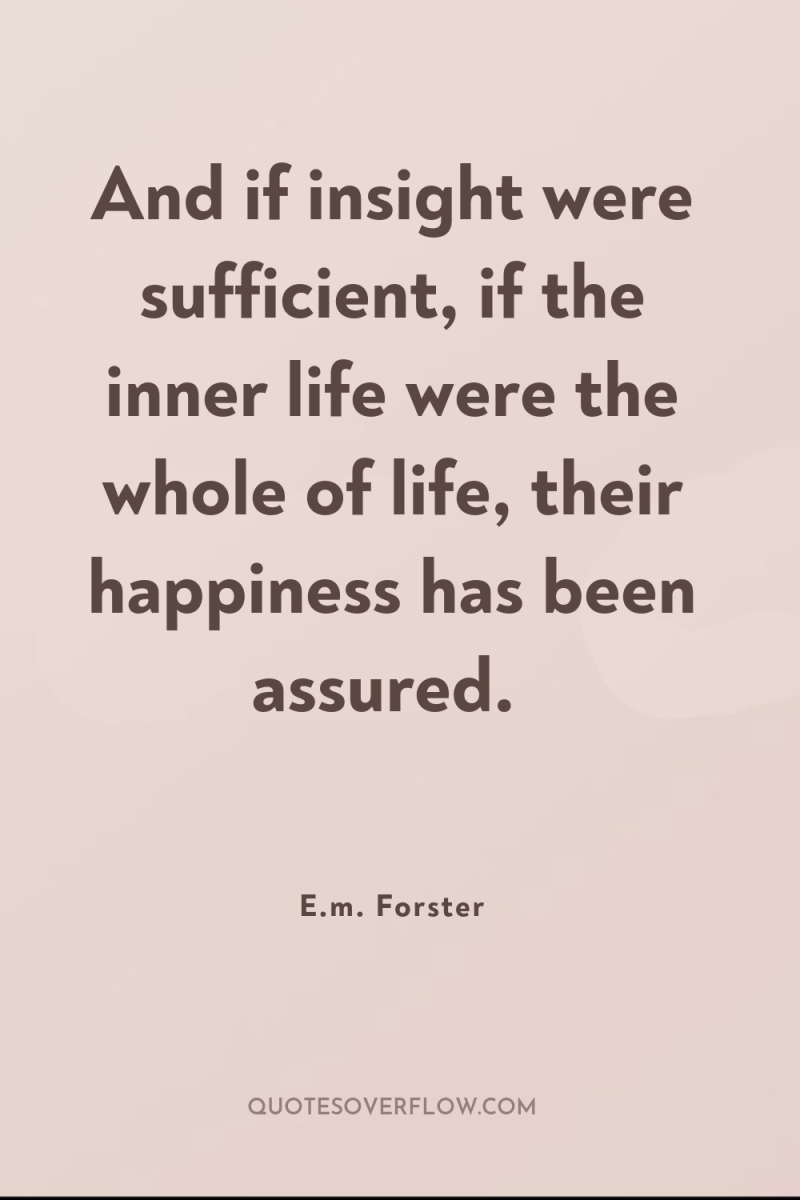
And if insight were sufficient, if the inner life were the whole of life, their happiness has been assured.E.m. Forster
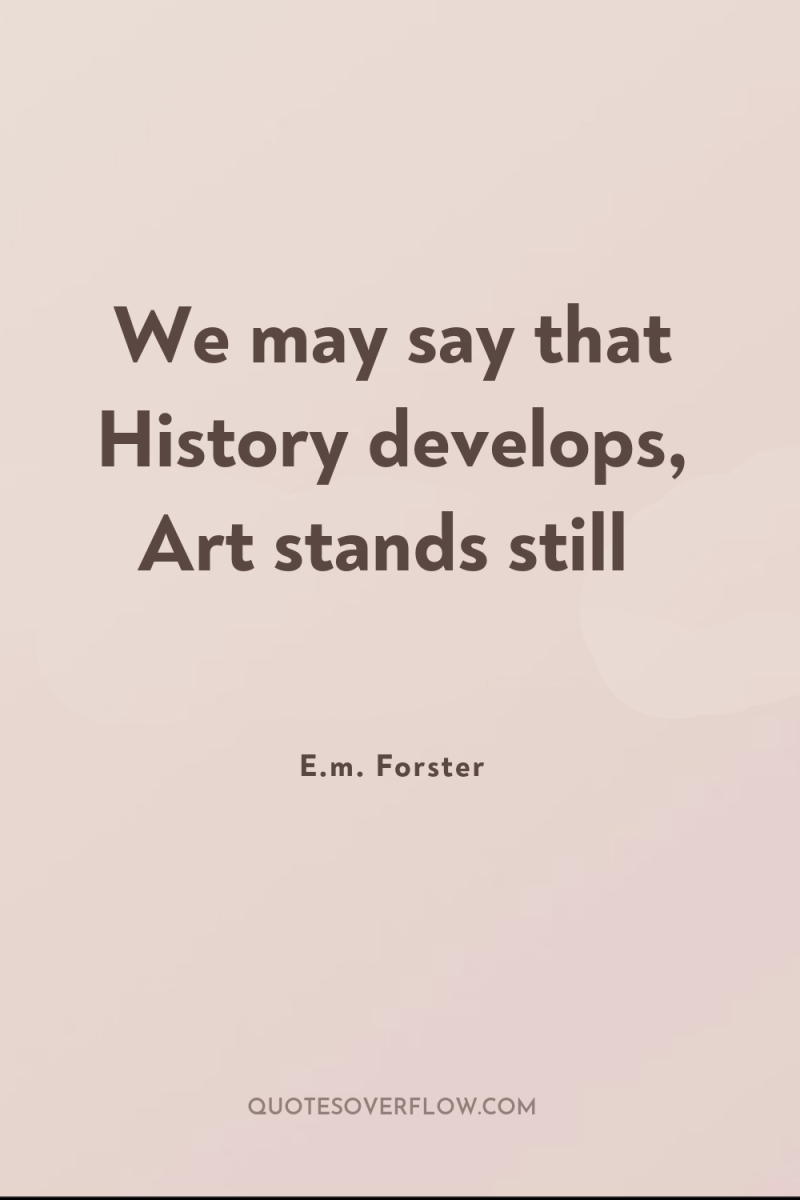
We may say that History develops, Art stands stillE.m. Forster
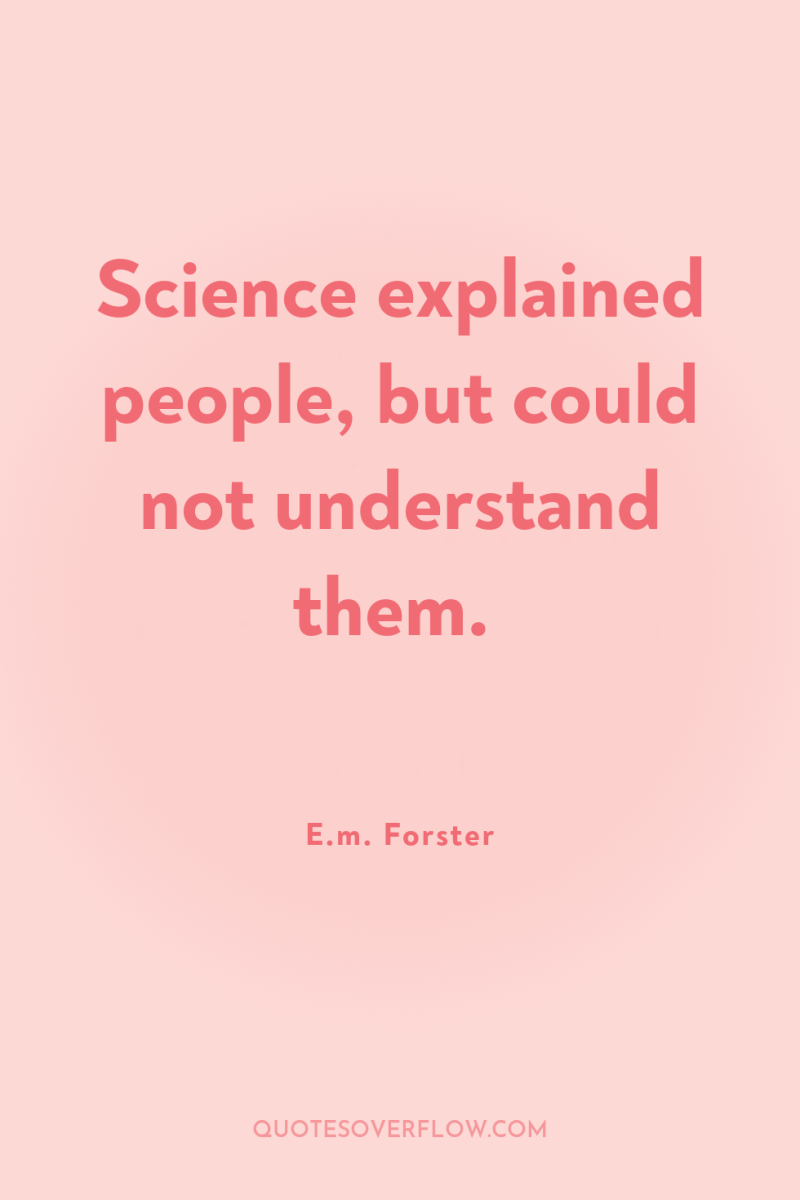
Science explained people, but could not understand them.E.m. Forster
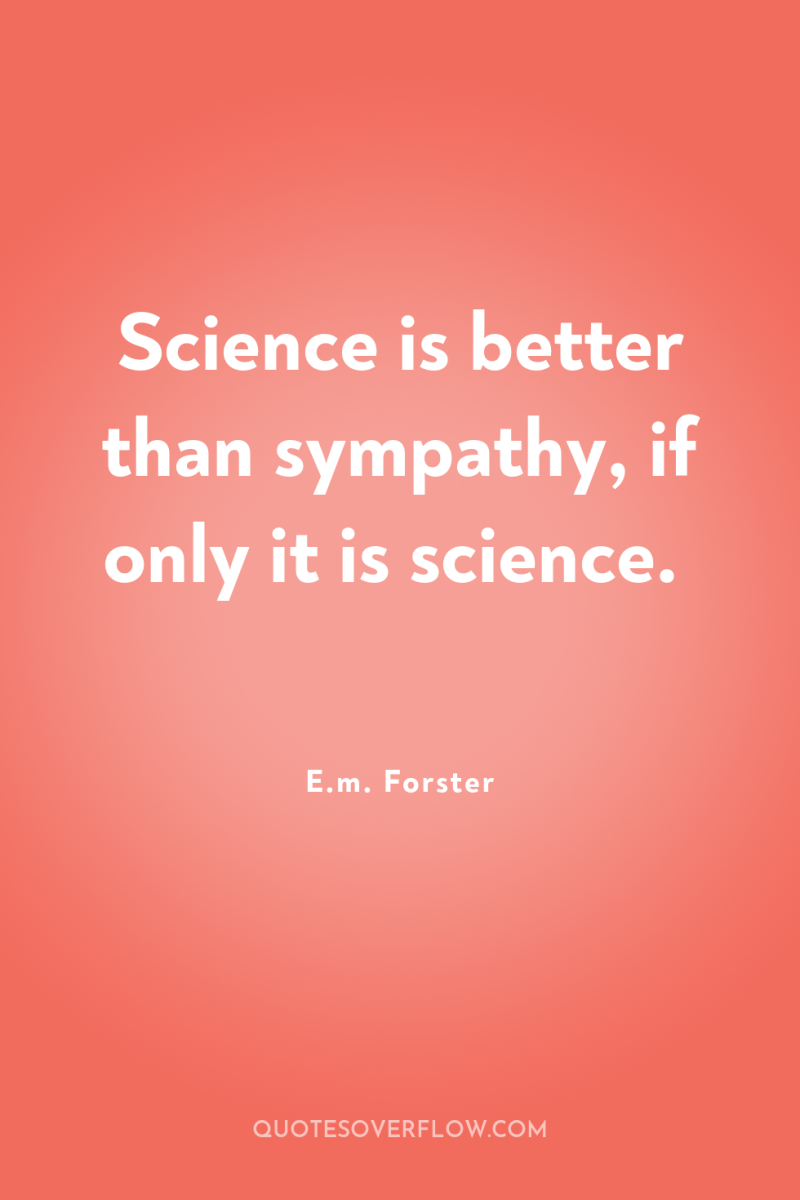
Science is better than sympathy, if only it is science.E.m. Forster
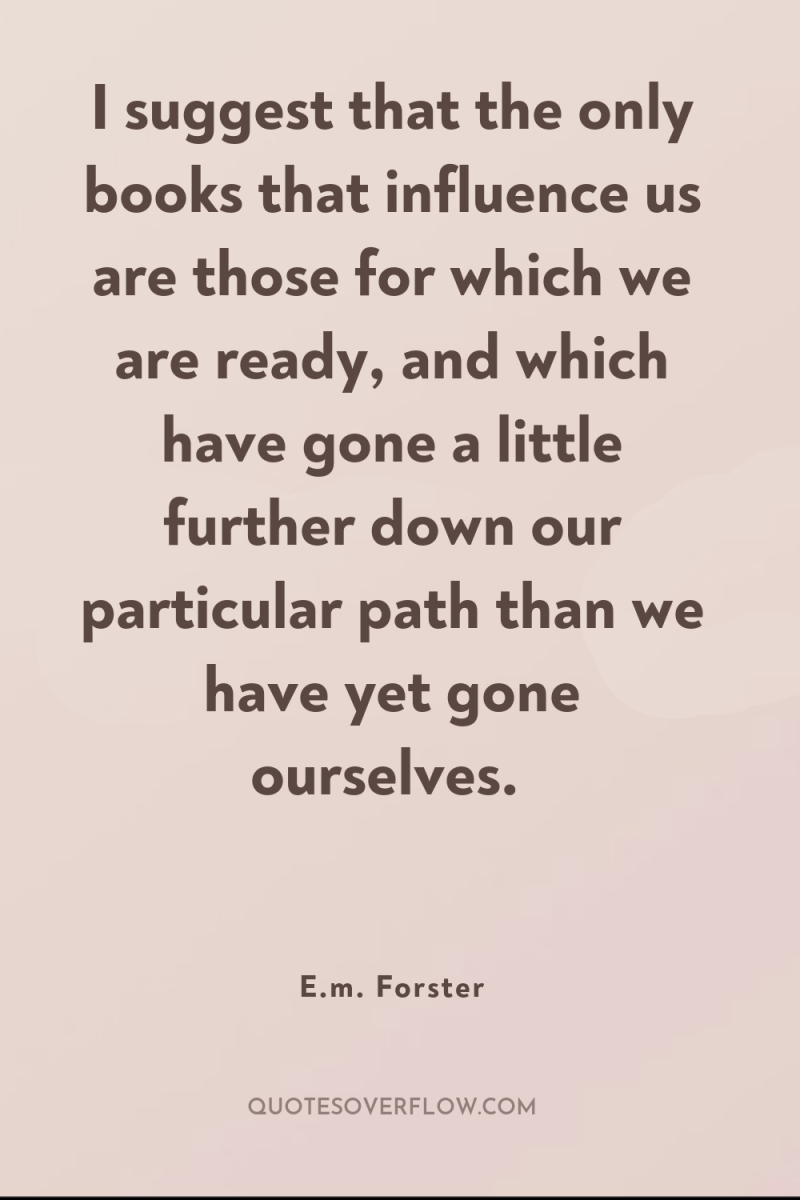
I suggest that the only books that influence us are those for which we are ready, and which have gone a little further down our particular path than we have yet gone ourselves.E.m. Forster
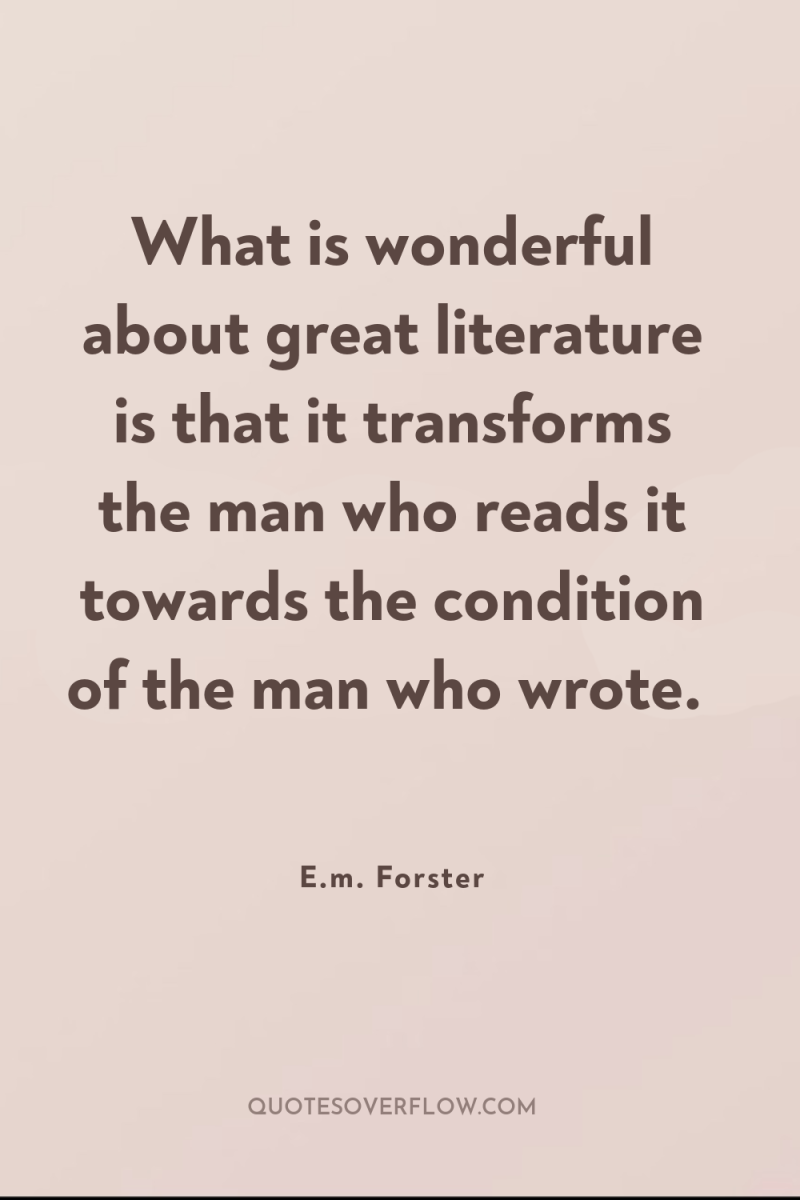
What is wonderful about great literature is that it transforms the man who reads it towards the condition of the man who wrote.E.m. Forster
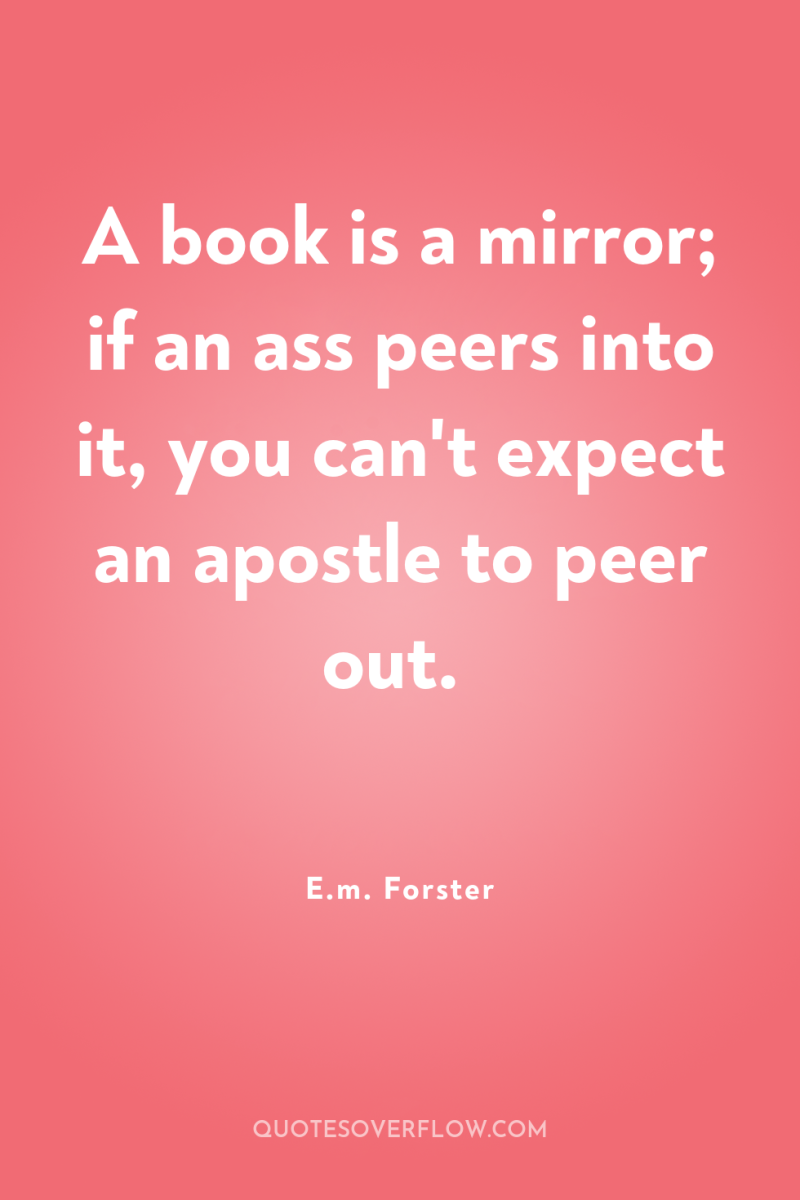
A book is a mirror; if an ass peers into it, you can't expect an apostle to peer out.E.m. Forster
Margaret had often wondered at the disturbance that takes place in the world's waters when Love, who seems so tiny a pebble, slips in. Whom does Love concern beyond the beloved and the lover? Yet his impact deluges a hundred shores,E.m. Forster
Was Mrs. Wilcox one of the unsatisfactory people- there are many of them- who dangle intimacy and then withdraw it? They evoke our interests and affections, and keep the life of the spirit dawdling around them. Then they withdraw. When physical passion is involved, there is a definite name for such behaviour- flirting- and if carried far enough, it is punishable by law. But no law- not public opinion, even- punishes those who coquette with friendship, though the dull ache that they inflict, the sense of misdirected effort and exhaustion, may be as intolerable. Was she one of these? .E.m. Forster
Why can't we be friends now?" said the other, holding him affectionately. "It's what I want. It's what you want." But the horses didn't want it – they swerved apart: the earth didn't want it, sending up rocks through which riders must pass single file; the temple, the tank, the jail, the palace, the birds, the carrion, the Guest House, that came into view as they emerged from the gap and saw Mau beneath: they didn't want it, they said in their hundred voices "No, not yet, " and the sky said "No, not there.E.m. Forster
He had a theory that musicians are incredibly complex, and know far less than other artists what they want and what they are; that they puzzle themselves as well as their friends; that their psychology is a modern development, and has not yet been understood.E.m. Forster

I won't be protected. I will choose for myself what is ladylike and right. To shield me is an insult.E.m. Forster
Pity, if one can generalize, is at the bottom of woman. When men like us, it is for our better qualities, and however tender their liking, we dare not be unworthy of it, or they will quietly let us go. But unworthiness stimulates woman. It brings out her deeper nature, for good or for evil.E.m. Forster
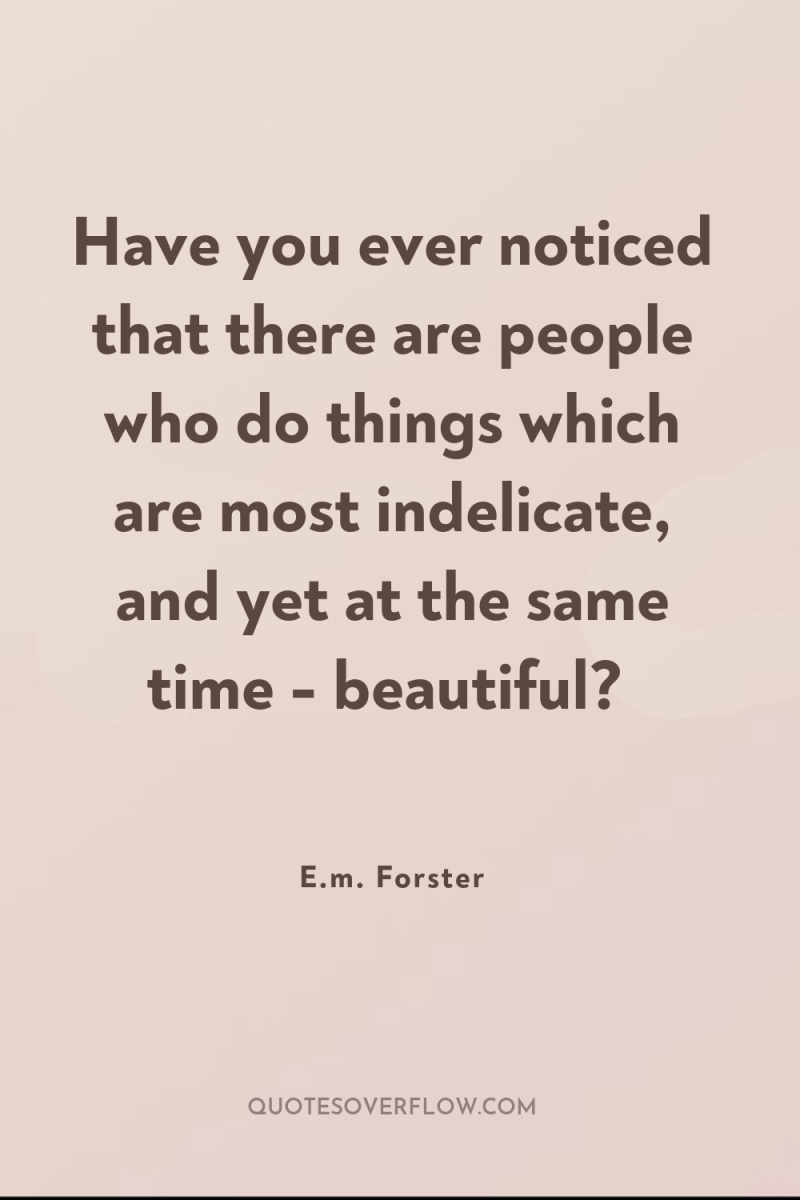
Have you ever noticed that there are people who do things which are most indelicate, and yet at the same time - beautiful?E.m. Forster
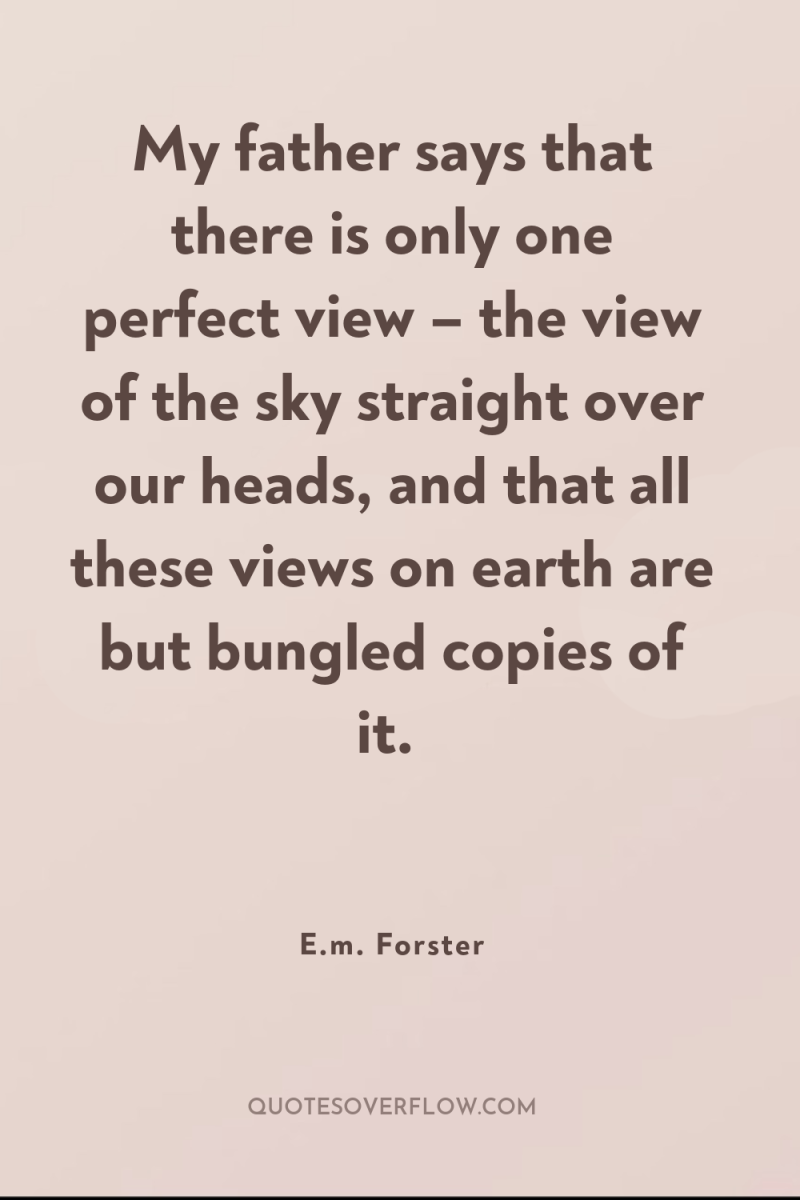
My father says that there is only one perfect view – the view of the sky straight over our heads, and that all these views on earth are but bungled copies of it.E.m. Forster
Beauty ought to look a little surprised: it is the emotion that best suits her face.... The beauty who does not look surprised, who accepts her position as her due–she reminds us too much of a prima donna.E.m. Forster
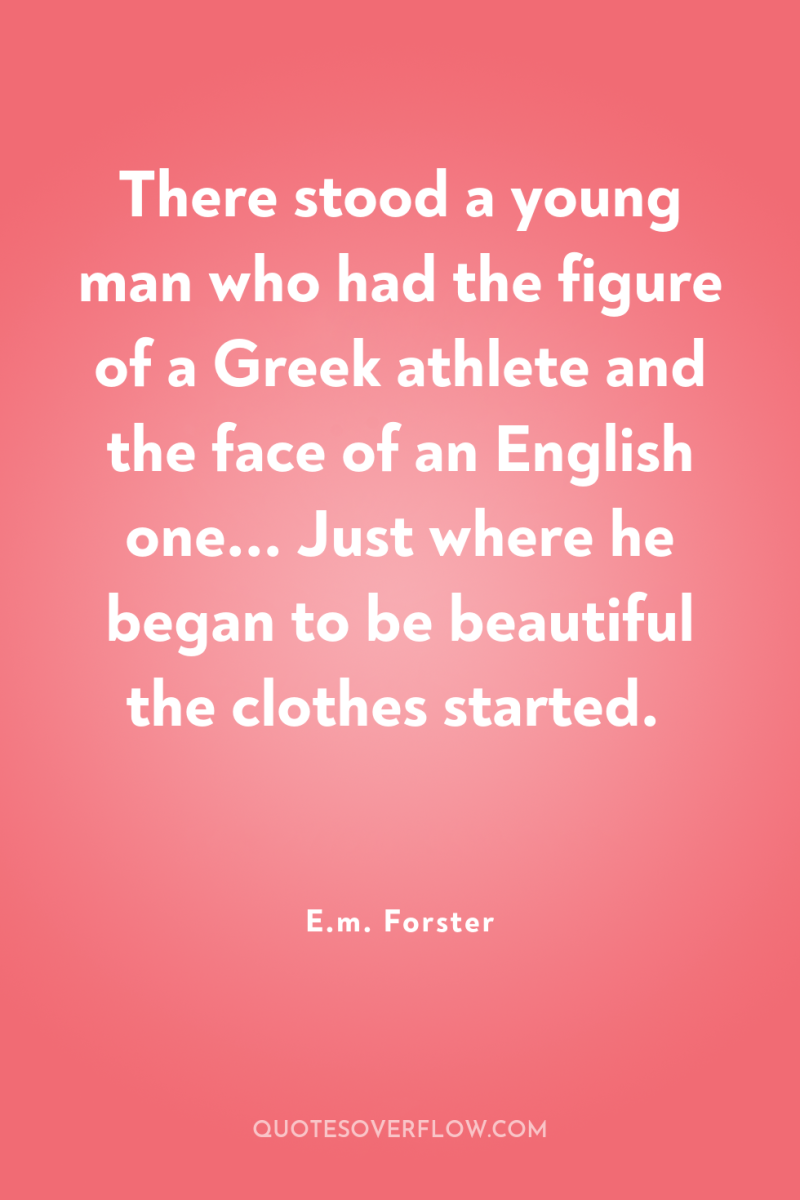
There stood a young man who had the figure of a Greek athlete and the face of an English one... Just where he began to be beautiful the clothes started.E.m. Forster
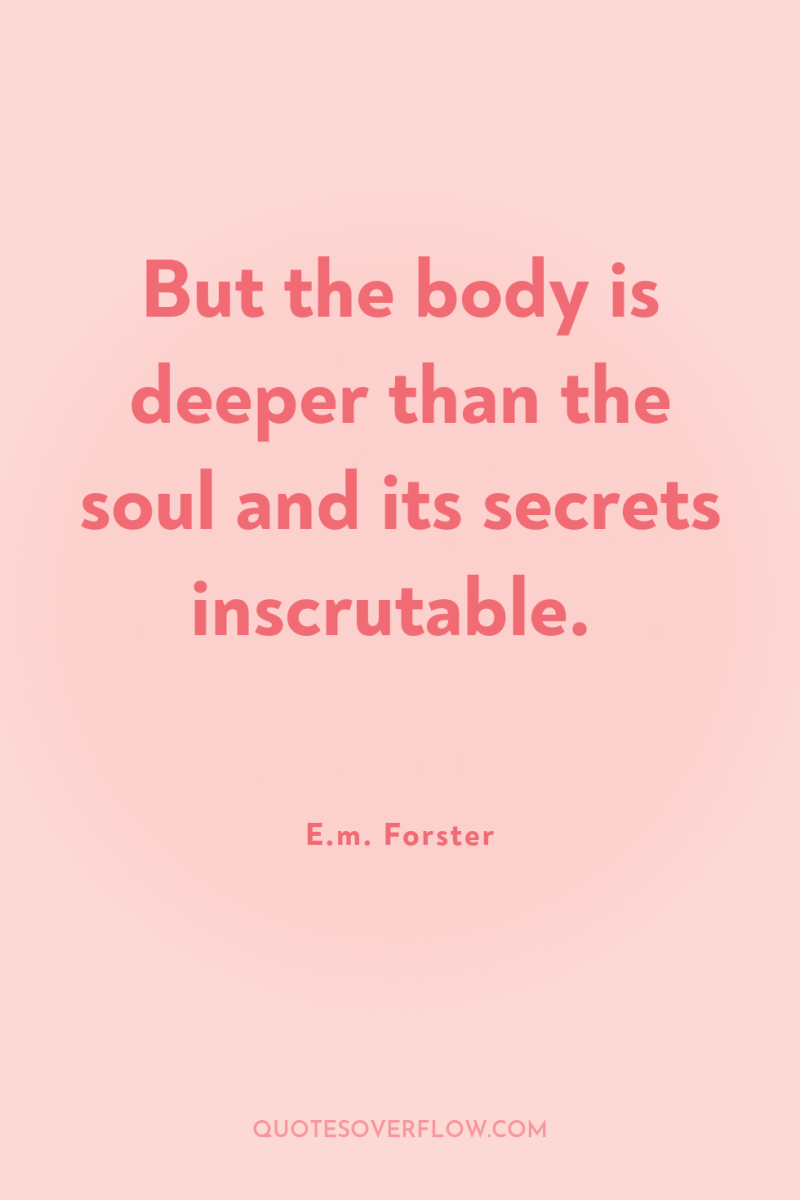
But the body is deeper than the soul and its secrets inscrutable.E.m. Forster
Works of art, in my opinion, are the only objects in the material universe to possess internal order, and that is why, though I don't believe that only art matters, I do believe in Art for Art's sake.E.m. Forster
To make us feel small in the right way is a function of art.E.m. Forster
If you introduce the human figure you at once arouse either disgust or desire.E.m. Forster
Long books, when read, are usually overpraised, because the reader wishes to convince others and himself that he has not wasted his time.E.m. Forster
I did not fear that I might tread upon a live rail and be killed. I feared something far more intangible-doing what was not contemplated by the Machine. Then I said to myself, “Man is the measure”, and I went, and after many visits I found an opening.E.m. Forster
Why children?' he asked. 'Why always children? For love to end where it begins is far more beautiful, and Nature knows it.E.m. Forster
I'm afraid that in nine cases out of ten Nature pulls one way and human nature another.E.m. Forster
I believed in a return to Nature once. But how can we return to Nature when we have never been with her? Today, I believe that we must discover Nature. After many conquests we shall attain simplicity. It is our heritage.E.m. Forster
An acquaintance had become a lover, might become a husband, but would retain all that she had noted in the acquaintance; and love must confirm an old relation rather than reveal a new one.E.m. Forster
The kingdom of music is not the kingdom of this world; it will accept those whom breeding and intellect and culture have alike rejected. The commonplace person begins to play, and shoots into the empyrean without effort, whilst we look up, marvelling how he has escaped us, and thinking how we could worship him and love him, would he but translate his visions into human words, and his experiences into human actions. Perhaps he cannot; certainly he does not, or does so very seldom.E.m. Forster
No; look out for the part where you think you have done with the goblins and they come back, ' breathed Helen, as the music started with a goblin walking quietly over the universe, from end to end.E.m. Forster
While her lips talked culture, her heart was planning to invite him to teaE.m. Forster
We move between two darknesses.E.m. Forster
Either life entails courage or it ceases to be life.E.m. Forster
All a child's life depends on the ideal it has of its parents. Destroy that and everything goes - morals, behavior, everything. Absolute trust in someone else is the essence of education.E.m. Forster
I'd far rather leave a thought behind me than a child. Other people can have children.E.m. Forster
For a wonderful physical tie binds the parents to the children; and–by some sad, strange irony–it does not bind us children to our parents. For if it did, if we could answer their love not with gratitude but with equal love, life would lose much of its pathos and much of its squalor, and we might be wonderfully happy.E.m. Forster
I was determined that in fiction anyway two men should fall in love and remain in it for the ever and ever that fiction allows.E.m. Forster
When we were only acquaintances, you let me be myself, but now you're always protecting me... I won't be protected. I will choose for myself what is ladylike and right. To shield me is an insult. Can't I be trusted to face the truth but I must get it second-hand through you? A woman's place!E.m. Forster
People turned out to be alive. Hitherto he had supposed that they were what he pretended to be - flat pieces of cardboard stamped with a conventional design… there came by no process of reason a conviction that they were human beings with feelings akin to his own.E.m. Forster
We must be willing to let go of the life we have planned, so as to have the life that is waiting for us.E.m. Forster
As for her hair, or rather hairs, they are too complicated to describe, but one system went down her back, lying in a thick pad there, while another, created for a lighter destiny, rippled around her forehead.E.m. Forster
The novelist defines the story with the following example: If you are told that the king died and then the queen died, that is a sequence of events. If you were told that the king died and then the queen died of grief, that is a story that he was interested.E.m. Forster
You talk as if a god had made the Machine, " cried the other. "I believe that you pray to it when you are unhappy. Men made it, do not forget that. Great men, but men. The Machine is much, but not everything.E.m. Forster
Few travelled in these days, for, thanks to the advance of science, the earth was exactly alike all over. Rapid intercourse, from which the previous civilization had hoped so much, had ended by defeating itself. What was the good of going to Peking when it was just like Shrewsbury? Why return to Shrewsbury when it would all be like Peking? Men seldom moved their bodies; all unrest was concentrated in the soul.E.m. Forster
Night and day, wind and storm, tide and earthquake, impeded man no longer. He had harnessed Leviathan. All the old literature, with its praise of Nature, and its fear of Nature, rang false as the prattle of a child.E.m. Forster
How can the mind take hold of such a country? Generations of invaders have tried, but they remain in exile. The important towns they build are only retreats, their quarrels the malaise of men who cannot find their way home. India knows of their trouble. She knows of the whole world's trouble, to its uttermost depth. She calls "Come" through her hundred mouths, through objects ridiculous and august. But come to what? She has never defined. She is not a promise, only an appeal. .E.m. Forster
Human beings have their great chance in the novel.E.m. Forster
Hardship is vanishing, but so is style, and the two are more closely connected than the present generation supposes.E.m. Forster
There is only a certain amount of kindness in the world…just as there is a certain amount of light. We cast a shadow on something wherever we stand, and it is no good moving from place to place to save things… Choose a place where you won’t do very much harm and stand in it for all you are worth, facing the sunshine.E.m. Forster
It is the starved imagination, not the well-nourished, that is afraid.E.m. Forster
He will work off his crudities in time. I rather mistrust young men who slip into life gracefully.E.m. Forster
Men were not gods after all, but as human and as clumsy as girls.E.m. Forster
The issues Miss Quested had raised were so much more important than she was herself that people inevitably forgot her.E.m. Forster
Unless we remember we cannot understand.E.m. Forster
It is not rubbish! It is the part of people that you do not understand.E.m. Forster
She grew more and more vexed with his dignified behavior. By a cruel irony, she was drawing out what was best in his disposition.E.m. Forster
As her time in Florence drew to a close she was only at ease amongst those to whom she felt indifferent.E.m. Forster